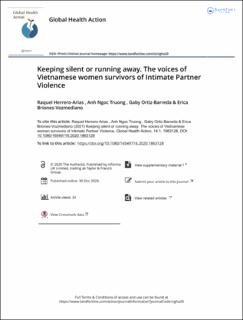| dc.contributor.author | Herrero-Arias, Raquel | |
| dc.contributor.author | Ngoc Truong, Anh | |
| dc.contributor.author | Ortiz-Barreda, Gaby M. | |
| dc.contributor.author | Briones-Vozmediano, Erica | |
| dc.date.accessioned | 2021-03-01T11:27:23Z | |
| dc.date.available | 2021-03-01T11:27:23Z | |
| dc.date.created | 2021-01-04T08:51:36Z | |
| dc.date.issued | 2020 | |
| dc.Published | Global health action. 2020, 14 (1), . | |
| dc.identifier.issn | 1654-9716 | |
| dc.identifier.uri | https://hdl.handle.net/11250/2730900 | |
| dc.description.abstract | Background: Legislative initiatives have been implemented to fight against Intimate Partner Violence (IPV) and offer protection to its survivors in Vietnam. However, this type of violence is relatively common in the country, where broader structural inequalities, like poverty and the system of male dominance, increase women’s vulnerability to IPV. Objective: This study aimed to explore the strategies that Vietnamese IPV survivors take to cope with the abuse from their partners and maximize their safety and wellbeing. Methods: Qualitative in-depth interviews were conducted with eight women survivors of IPV who lived in one of the Peace House Shelter in Hanoi. Participants were recruited through the shelter. Data were collected using semi-structured interviews and analyzed using qualitative content framed by the theoretical concept of the patriarchal bargain. Results: The IPV survivors in our study took two main strategies to cope with IPV: keeping silent and/or leaving the abuser. Leaving was a challenging strategy because it required support from others, something that was difficult to find due to the social stigma associated with divorce and the normalization of violence in intimate relationships. This was specially the case for participants coming from rural areas who did not count on a social network in the city where the shelter is located. The women strategized within a complex set of structural constrains like poverty, cultures of honor, social stigma, and traditional gender roles. As active agents, they decided whether challenging the patriarchal system would optimize their life options. Motherhood also played a crucial role in women’s decisions regarding IPV. Conclusion: A strategy of conformity like silence can be a tactic for women to cope with a system of male dominance while navigating complex structural inequalities. To better address IPV in Vietnam, interventions should be sensitive to the structural gender inequalities within family and societal contexts. | en_US |
| dc.language.iso | eng | en_US |
| dc.publisher | Taylor & Francis | en_US |
| dc.rights | Navngivelse 4.0 Internasjonal | * |
| dc.rights.uri | http://creativecommons.org/licenses/by/4.0/deed.no | * |
| dc.title | Keeping silent or running away. The voices of Vietnamese women survivors of Intimate Partner Violence | en_US |
| dc.type | Journal article | en_US |
| dc.type | Peer reviewed | en_US |
| dc.description.version | publishedVersion | en_US |
| dc.rights.holder | Copyright 2020 The Author(s). | en_US |
| dc.source.articlenumber | 1863128 | en_US |
| cristin.ispublished | true | |
| cristin.fulltext | original | |
| cristin.qualitycode | 1 | |
| dc.identifier.doi | 10.1080/16549716.2020.1863128 | |
| dc.identifier.cristin | 1864511 | |
| dc.source.journal | Global health action | en_US |
| dc.source.40 | 14 | |
| dc.source.14 | 1 | |
| dc.identifier.citation | Global health action. 2021, 14 (1), 1863128 | en_US |
| dc.source.volume | 14 | en_US |
| dc.source.issue | 1 | en_US |

